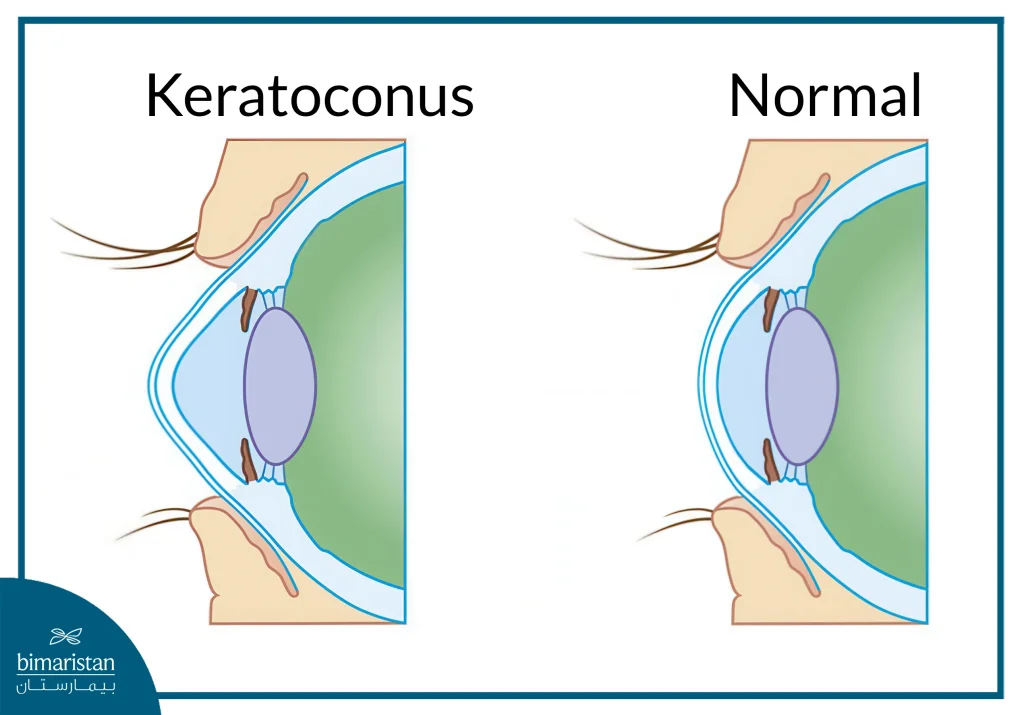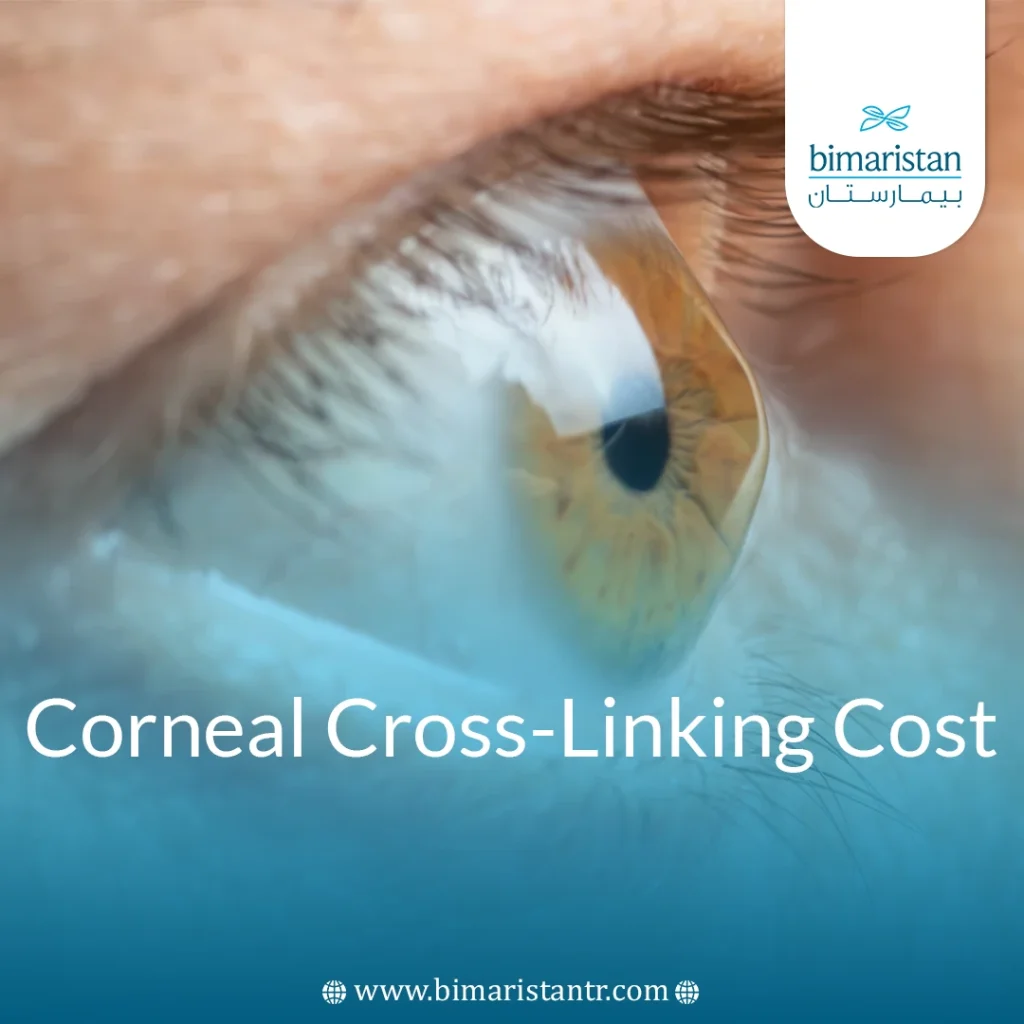Turkey is today one of the most prominent medical destinations in the field of keratoconus treatment, thanks to the great progress in ophthalmology. When looking for an effective and safe option for keratoconus stabilization, Turkey stands out because of its advanced technologies and modern devices. In addition to that, the corneal cross-linking cost in Turkey is low compared to other countries, which has made Turkey one of the most attractive destinations for patients from different parts of the world.
What is corneal cross-linking?
Keratoconus is an eye condition that affects normal vision, in which the cornea slowly changes shape from domed to cone-shaped, which prevents light rays from entering the eye from being properly positioned on the retina, resulting in blurry and unclear vision.

Stabilization is a process in which the thin surface layer of the cornea is removed, and then drops of riboflavin solution are applied to it. After the solution is absorbed, low-energy light is shone for a short period, which stimulates the crosslinking of collagen fibers within the cornea and halts the progression of keratoconus.
Average corneal cross-linking cost in Turkey
The average corneal cross-linking cost in Turkey ranges from 700 to 1,500 USD per eye, depending on the type of technique used (epi-off or epi-on), the doctor’s experience, and the medical center’s equipment.
Comparison of the corneal cross-linking cost in Turkey and other countries
The following table shows the corneal cross-linking costs in Turkey and other countries
| State | Average cost (per eye) in US dollars |
|---|---|
| Turkey | 700 – $1,500 |
| Germany | 2,000 – $3,500 |
| Britain | 2,500 – 4,000 dollars |
| United States | 3,000 – 5,000 dollars |
| Canada | 2,000 – $3,500 |
| Spain | $1,800 – $3,000 |
What factors affect the corneal cross-linking cost in Turkey?
- Type of technique used: Surface fixation (epi-off) or no epithelialization (epi-on), as the cost varies between the two methods.
- The doctor’s expertise and the hospital’s reputation: Specialized doctors and highly rated centers usually have a higher cost.
- The geographical location of the hospital: Prices in Istanbul or Ankara are often higher than in smaller cities.
- Accompanying services: Tests, follow-ups, medications, and therapeutic contact lenses.
- The patient’s clinical condition: The Severity of keratoconus progression may require additional procedures such as corneal ring implantation before or after stabilization.
- The type of equipment and techniques used: Some centers use ultra-modern equipment or updated protocols (such as Accelerated CXL), which increases the price.
- The need for complementary procedures: Such as lens implants or aberration correction, may add to the cost of treatment.
Comparison of keratoconus cross-linking costs in Turkey according to the technique used
The following table compares the keratoconus cross-linking cost of different techniques used in Turkey, showing the differences in technique and cost:
| Technique | Brief description | Estimated cost (USD/eye) | Main advantages |
|---|---|---|---|
| Epi-off Cross-Linking | Remove the epithelium before applying riboflavin | 700 – 1,500 | Most popular and proven effective |
| Epi-on (Transepithelial) CXL | No epithelial removal, faster recovery | 900 – 1,800 | Greater patient comfort, faster recovery |
| Accelerated CXL | Shorten treatment time by using a higher light dose | 1,000 – 1,700 | Shorter treatment time with almost the same efficiency |
| Customized CXL (PiXL) | Guided fixation using a corneal map | 1,500 – 2,200 | Higher accuracy, customized to the shape of the deformation |
| CXL + corneal ring transplant | Common procedure for advanced cases | 2,000 – 3,500 | Improved corneal shape and vision |
What makes Turkey an excellent destination for corneal cross-linking surgery?
Turkey is a distinctive destination for corneal cross-linking surgery for several reasons, the most important of which is the relatively low cost compared to European and American countries, while maintaining high medical quality and a high success rate of more than 95%, in addition to that, Turkey includes a group of experienced ophthalmologists, and uses the latest treatment techniques such as Cross-Linking and Accelerated CXL. Hospitals also provide an advanced treatment environment and international sterilization standards, along with additional services such as hotel reception and medical transportation, making the treatment experience comprehensive and comfortable for international patients. All these factors make Turkey a great choice for keratoconus surgery.
What criteria help in choosing the best hospital for corneal cross-linking surgery in Turkey?
- International accreditation: Having quality certificates or accreditation from recognized health organizations.
- Feedback from patients: Ascertain past experiences and patient satisfaction.
- Clear and detailed costing: The hospital should include a cost that includes testing and follow-up.
- Availability of state-of-the-art technologies: State-of-the-art technologies for keratoconus stabilization, such as Epi-off and Accelerated CXL, are available.
In conclusion, keratoconus cross-linking is an effective medical option for halting the progression of the disease and preserving vision, especially when performed in its early stages. Turkey is a prominent destination for this procedure, thanks to its highly qualified medical staff, advanced technologies, and competitive prices. The corneal cross-linking cost in Turkey is typically lower than in other countries, making it a preferred option for many patients from around the world. Choosing the right specialized hospital ensures safe results and comprehensive care from diagnosis to follow-up.
Sources:
- Vohra, V., Tuteja, S., Gurnani, B., & Chawla, H. (2025). Collagen Cross-Linking for Keratoconus. In StatPearls. StatPearls Publishing.
- New York State Department of Health. (2024, July 25). Medical policy: Keratoconus. Retrieved from New York State Department of Health website
